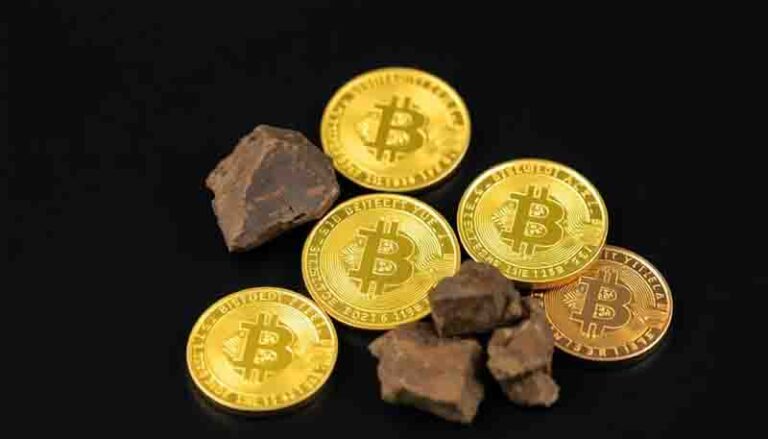Why Digital Beats Traditional Market: Investment Evolution Explained
Note: This post may contain affiliate links, and we may earn a commission (with No additional cost for you) if you purchase via our link. See our disclosure for more info. The gold and crypto world is constantly changing. This is not financial, investment, legal, or professional advice. So, please verify the information on the gold and cryptocurrency provider’s websites.
Did you know that Bitcoin's market cap reached over $1 trillion in 2021, surpassing the value of many traditional financial institutions? This staggering figure highlights the rapid rise of digital currencies in the investment world. You're likely wondering how these new assets stack up against time-tested options like gold. As we explore the evolution of investing, you'll discover why digital currencies are reshaping financial landscapes and attracting both seasoned investors and newcomers alike. The reasons behind this shift might surprise you, and they're essential for understanding where your investment strategy should be headed in the coming years.
Key Takeaways
- Digital assets offer enhanced liquidity and global market accessibility, enabling instant transactions and broader investment opportunities.
- Fractional ownership in digital markets democratizes investing, allowing participation in high-value assets with lower capital requirements.
- Blockchain technology provides increased transparency, security, and decentralization, reducing reliance on traditional financial intermediaries.
- Digital platforms offer real-time analytics and mobile trading, empowering investors with immediate market data and swift decision-making capabilities.
- Technological advancements in finance have significantly reduced transaction costs and improved information access for retail investors.
The Rise of Digital Currencies
As the investment landscape evolves, digital currencies have emerged as a disruptive force, challenging traditional investment paradigms. Bitcoin, the most prominent digital currency, operates on blockchain technology, offering decentralized transactions without a central authority. This innovation enhances security and transparency, attracting both institutional and retail investors.
The rise of digital currencies has prompted a significant shift in investment strategies. Bitcoin's unique characteristics, such as its capped supply of 21 million coins, create scarcity that can drive value as demand increases. This scarcity, combined with its potential for high returns, has led many investors to view Bitcoin as a compelling alternative to traditional assets.
Key advantages of digital currencies:
- Decentralized nature
- Enhanced security and transparency
- Potential for significant returns
However, it's crucial to understand that Bitcoin's volatility presents both risks and opportunities. Price fluctuations, influenced by market sentiment and news, can be substantial. Despite this, Bitcoin has historically outperformed traditional investments during bull markets, showcasing its unique market dynamics and appeal as an asset class.
As digital currencies continue to gain traction, they're reshaping the investment landscape and challenging long-held assumptions about portfolio allocation and risk management.

Gold's Historical Investment Role
When you consider gold's historical investment role, you'll find it has long served as a store of value and hedge against inflation.
Its ability to maintain purchasing power over time has made it a popular choice for portfolio diversification, especially during economic uncertainties.
You'll notice that gold's performance often moves independently of stocks and bonds, potentially offering protection when other assets decline in value.
Gold's Store-Of-Value Function
Gold's enduring reputation as a store of value spans millennia. This precious metal has consistently maintained its purchasing power, even as fiat currencies have faltered. During economic crises, investors often turn to gold as a safe haven, driving up demand and prices.
The Securities and Exchange Commission (SEC) recognizes gold's role in diversifying investment portfolios, acknowledging its potential to hedge against inflation and currency devaluation.
Gold's scarcity contributes to its value preservation. With only 197,576 metric tons mined throughout history, its finite supply guarantees long-term stability. This characteristic has made gold an attractive option in the financial services sector, where it's used to balance risk in investment strategies.
- Proven track record: Gold has preserved wealth for thousands of years
- Crisis-resistant: Demand surges during economic uncertainties
- SEC-acknowledged: Recognized as a valuable portfolio diversifier
- Supply-limited: Scarcity maintains long-term value
In 2020, gold prices soared to over $2,000 per ounce, demonstrating its continued relevance in modern investment landscapes.
As you consider your investment options, gold's historical performance and store-of-value function merit serious consideration.
Inflation Hedge Properties
Beyond its function as a store of value, gold has played a pivotal role in protecting investors against inflation throughout history. The precious metal's ability to retain purchasing power during periods of currency devaluation has made it a cornerstone of many investment portfolios.
This inflation hedge property is evident in several key aspects:
- Historical performance: During the 1970s, when inflation rates soared, gold prices skyrocketed from $35 to over $800 per ounce, demonstrating its effectiveness as a hedge.
- Correlation with inflation: Gold prices often rise in tandem with inflation rates, providing a natural safeguard against eroding currency values.
- Institutional confidence: Central banks and large investors frequently increase their gold holdings during inflationary periods, signaling trust in its protective qualities.
- Long-term resilience: Over the past two decades, gold has shown remarkable strength against inflation, with prices rising from $300 to over $1,800 per ounce.
These factors underscore gold's importance in asset allocation strategies, especially when inflation expectations are high.
As monetary policy shifts and economic uncertainties arise, gold's inflation hedge properties continue to make it a valuable component of diversified investment portfolios.

Portfolio Diversification Benefits
Throughout history, gold has played a pivotal role in portfolio diversification, offering investors a unique blend of stability and growth potential. When conducting a risk tolerance assessment, you'll find that gold's negative correlation with equities makes it an excellent tool for reducing overall portfolio risk. As stock markets decline, gold often appreciates, providing a cushion against market volatility.
Asset allocation strategies often include gold for its ability to enhance portfolio diversification. Institutional investors typically allocate 5-10% of their portfolios to gold, recognizing its potential to improve risk-adjusted returns. This allocation can be particularly beneficial during economic downturns, as gold has historically served as a hedge against inflation and currency devaluation.
When considering your investment horizon, it's crucial to recognize gold's long-term performance. Over the past 50 years, gold has maintained an average annual return of approximately 10%, outperforming many traditional asset classes. During financial crises, such as the 2008 recession, gold prices surged, demonstrating its role as a safe-haven asset.
- Provides stability during economic downturns
- Offers negative correlation with equities
- Enhances overall portfolio diversification
- Serves as an inflation hedge
- Delivers competitive long-term returns
Decentralization and Financial Freedom
Decentralization has revolutionized the financial landscape, offering individuals unprecedented control over their assets and transactions. Through peer-to-peer transactions, you can bypass traditional banks and intermediaries, gaining direct control over your finances.
This shift enhances trust and security through blockchain technology, which provides a transparent and immutable ledger without relying on a central authority.
The benefits of decentralization and financial freedom include:
- Lower transaction fees compared to traditional financial institutions
- Inflation-resistant digital currencies, such as Bitcoin with its capped supply
- Greater financial inclusion through decentralized finance (DeFi) platforms
- Enhanced privacy and security in financial transactions

Volatility and Risk Assessment
While decentralization offers numerous advantages, it's important to reflect on the volatility and risk associated with digital investments like Bitcoin. The cryptocurrency's price can swing dramatically, sometimes exceeding 10% in a single day. This extreme volatility necessitates careful risk assessment and the implementation of robust risk management strategies.
– Market Sentiment Analysis
Understanding market sentiment is significant when investing in Bitcoin. The asset's scarcity, limited to 21 million coins, contributes to price fluctuations based on demand and investor perception.
– Risk vs. Reward
Bitcoin's potential for explosive growth during bull markets, often surpassing 300% in less than a year, contrasts sharply with traditional investments. However, this upside comes with the possibility of substantial losses due to Bitcoin's unpredictable nature.
– Price Prediction Models
While various models attempt to forecast Bitcoin's price movements, the asset's volatility makes accurate predictions challenging. You'll need to weigh multiple factors and scenarios when evaluating potential investments.
To make informed decisions, you must conduct thorough risk assessments, balancing the high-reward potential against the increased volatility. By employing a combination of market analysis, risk management techniques, and diversification strategies, you can navigate the dynamic landscape of digital investments more effectively.
Liquidity and Market Accessibility
In the digital age, you can execute trades instantly from anywhere in the world, giving you unprecedented access to global markets.
You're no longer limited by traditional trading hours or geographical boundaries, allowing you to participate in various markets as opportunities arise.
Additionally, many online platforms now offer fractional asset ownership, enabling you to invest in high-value stocks or other assets with smaller amounts of capital, further democratizing market access.
Instant Trades, Anytime
Gone are the days when you'd to wait for the opening bell to make a trade. The digital revolution has transformed the investment landscape, offering you unprecedented access to financial markets. With online trading platforms, you can now execute trades instantly, 24/7, from anywhere with an internet connection. This accessibility has democratized investing, allowing a broader range of individuals to participate in the markets.
The advantages of instant, anytime trades are numerous:
- Real-time analytics enable you to make informed decisions based on up-to-the-minute market data.
- Mobile trading apps put the power of the markets in your pocket, allowing you to react swiftly to opportunities.
- Enhanced user experience through intuitive interfaces makes trading more accessible to novice investors.
- High liquidity in digital markets guarantees you can buy or sell assets quickly, minimizing the risk of price fluctuations.
Automatic order execution systems have considerably reduced processing times, guaranteeing that your trades are completed without delay.
This speed, combined with lower minimum investment requirements from online brokerages, has made it easier than ever for you to engage in trading. The ability to trade instantly, anytime, has truly revolutionized the investment world, giving you greater control over your financial future.

Global Market Participation
Traditional barriers to global market participation have crumbled in the digital age. You now have unprecedented access to worldwide investment opportunities, thanks to online trading platforms. These platforms have revolutionized the way you can engage with global markets, allowing you to trade from anywhere with an internet connection. The emergence of digital currencies like Bitcoin has further expanded your options, providing 24/7 trading possibilities without the constraints of traditional market hours.
| Feature | Traditional | Digital |
|---|---|---|
| Access | Limited | Global |
| Trading Hours | Fixed | 24/7 |
| Fees | High | Low |
The reduction in commission fees, often around $10 per trade for online brokers, has made it more affordable for you to participate in global markets. This accessibility has led to the rise of online trading communities and social trading trends, where you can share global investment strategies with peers worldwide. Enhanced information access through online resources empowers you to make informed decisions quickly, attracting more participants and increasing overall market liquidity. By bypassing traditional brokers, you can now engage with global markets on your own terms, democratizing investment opportunities and expanding your potential for financial growth.
Fractional Asset Ownership
Nowadays, fractional asset ownership has revolutionized investment accessibility. This innovative approach allows you to purchase portions of high-value assets, opening doors to investments that were once out of reach due to steep costs.
Fractional ownership benefits include increased liquidity, diversification, and democratized access to various markets.
Here's how fractional ownership enhances your investment experience:
- Improved liquidity: You can buy and sell smaller portions of assets, increasing transaction frequency and market fluidity.
- Diversification: Invest in multiple assets without significant capital, spreading risk across various sectors.
- Retail investor access: Participate in markets like real estate and art with lower minimum investments.
- Transparency: Digital marketplaces facilitate fractional asset trading, providing clear information for informed decisions.
Asset liquidity strategies have evolved with fractional ownership, allowing you to adjust your portfolio more easily. You're no longer tied to large, illiquid investments.
Instead, you can fine-tune your holdings based on market conditions and personal goals. This flexibility is particularly beneficial for retail investors, who can now access previously exclusive investment opportunities.

Technological Advancements in Finance
Over the past few decades, technological advancements have reshaped the landscape of finance, fundamentally altering how investors interact with markets. The rise of the Internet has ushered in an era of electronic trading, empowering retail investors with unprecedented access and cost-efficiency.
You'll find that online brokers now offer trades for around $10, a dramatic reduction from the 2.5% commission rates of traditional full-service brokers.
This digital revolution has democratized investing through:
- Enhanced information access via SEC and financial websites
- Direct market participation, bypassing intermediaries
- Narrower bid-ask spreads due to high-frequency trading
Algorithmic trading strategies have further streamlined the investment process, allowing for rapid execution and market analysis.
Robo-advisory services now provide automated portfolio management, tailored to individual risk profiles and financial goals. These fintech innovations have made sophisticated investment tools accessible to a broader audience.
You'll benefit from increased transparency, lower costs, and more efficient markets.
With a wealth of information at your fingertips and powerful digital tools, you're better equipped than ever to make informed investment decisions and navigate the complex world of finance.
Regulatory Landscape and Adoption
A rapidly evolving regulatory landscape surrounds digital assets like cryptocurrencies, shaping their adoption and market dynamics. As you navigate this new investment frontier, you'll find that regulatory clarity is becoming increasingly important. The U.S. Securities and Exchange Commission (SEC) has been actively evaluating digital currencies, providing more guidance for investors and institutions alike.
This evolving regulatory environment is creating a framework that balances innovation and consumer protection. Here's how it's impacting the digital investment space:
- Increased institutional adoption due to clearer guidelines
- Enhanced investor protections through regulatory oversight
- Greater market stability as regulations mature
- Improved global coordination among regulatory bodies
You'll notice that as institutional frameworks develop, they're fostering a safer investment environment while still promoting innovation. This balance is essential for the long-term growth and sustainability of digital assets.
As you consider investing in cryptocurrencies, keep in mind that the ongoing dialogue between regulators and the crypto industry is shaping guidelines that encourage responsible adoption. These efforts are aimed at creating a more stable and accessible market for both individual and institutional investors, potentially giving digital investments an edge over traditional options regarding regulatory adaptation and market responsiveness.
Future Outlook for Investors
Building on the evolving regulatory landscape, the future outlook for investors in digital assets appears promising. As we look at future trends, it's clear that digital investments are gaining momentum. The total market capitalization of cryptocurrencies exceeding $2 trillion demonstrates growing interest from both retail and institutional investors.
Investment strategies are shifting to accommodate this new asset class. Traditional methods may struggle to match the returns seen in digital assets, particularly during bull markets. This shift is especially pronounced among younger generations:
- Approximately 47% of millennial and Gen Z investors now hold cryptocurrency
- These generational shifts indicate a long-term trend towards digital asset adoption
The rise of decentralized finance (DeFi) platforms offers new opportunities for investors:
- Higher yields compared to traditional banking products
- Innovative financial products challenging established systems
As blockchain technology advances and regulations become clearer, you can expect:
- Increased legitimacy of digital assets
- Wider adoption across various sectors
For future investors, this evolving landscape presents both opportunities and challenges. You'll need to stay informed about technological developments and regulatory changes to navigate this new investment terrain effectively.
Frequently Asked Questions
How Is Cryptocurrency Different From Traditional Investment?
Cryptocurrency differs from traditional investments in several key ways:
- It operates on blockchain technology, enabling decentralized finance without intermediaries.
- You'll experience higher volatility, potentially leading to greater returns or losses.
- It's accessible 24/7, unlike stock markets with set trading hours.
- Transactions often have lower fees compared to traditional brokers.
- There's a fixed supply for some cryptocurrencies, like Bitcoin's 21 million coin cap.
- It's not regulated by central authorities, offering more financial freedom but also increased risk.
Why Passive Investing Beats Active Investing?
Passive investing beats active investing for several reasons:
- Lower fees: You'll pay less in expenses, preserving more of your returns.
- Market efficiency: It's difficult for active managers to consistently outperform the market.
- Diversification: You gain broad market exposure, reducing risk.
- Simplicity: You don't need to analyze individual stocks or time the market.
- Long-term performance: Studies show most active funds underperform their benchmarks over time.
What Are the Benefits of Investing in Digital Assets?
While traditional investments offer stability, digital assets present unique opportunities. You'll benefit from:
- Lower transaction fees
- Enhanced accessibility
- Increased transparency through blockchain technology
- Potential for high returns due to scarcity and volatility
To maximize these benefits, consider:
- Implementing risk management strategies
- Diversifying your portfolio with a mix of digital assets
- Understanding digital asset valuation methods
Remember, digital assets can be volatile, so it's essential to educate yourself and invest responsibly.
How Has the Internet Changed Investing?
The internet has revolutionized investing in several ways. You now have access to online trading and investment platforms, making market accessibility easier than ever.
These platforms offer real-time market data, research tools, and low-cost trades. You can execute trades instantly, manage your portfolio, and access a wealth of financial information from anywhere.
The internet has democratized investing, allowing you to make informed decisions without relying on traditional brokers. It's also increased market efficiency through improved price discovery and reduced transaction costs.
Conclusion
You're witnessing a financial revolution that's reshaping the investment landscape at lightning speed. Digital currencies offer unparalleled accessibility, liquidity, and growth potential, outpacing traditional assets like gold. With blockchain technology enabling decentralized transactions and fractional ownership, you've got more opportunities than ever before. While risks exist, technological advancements and increasing adoption suggest digital assets are the future of investing. Don't let this chance slip through your fingers; educate yourself and consider diversifying your portfolio with digital currencies.












